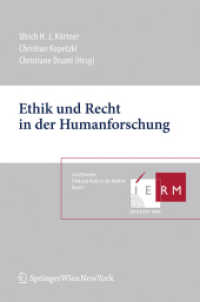Full Description
The book's focus is on freedom of speech and what content can place it in jeopardy. The sources, discussions and limitations of free speech, the relationship between ideology, freedom of speech in the media, and public issues are analyzed. From historical point of view, the citizens of more or less democratic societies assume freedom of speech as a basic right to challenge dictatorships, totalitarianisms and authority of any kind. Freedom of speech cannot be understood without the fundamental principles of democratic society, including a tolerance of others, their right to express various and unique opinions, open to challenge by others, and requiring mutual respect. Three domains for social responsibility concerning freedom of speech are addressed: practical, ecological and creative.
Contents
Preface - Acknowledgment - List of Abbreviations - Introduction - Chapter 1: Speechless populations: Despite freedom - Chapter 2: Can freedom of speech undermine democracy? - Chapter 3: The controversies of political correctness - Chapter 4: Instrumental rationality and progress - Chapter 5: Managing the tension between freedom and equality - Chapter 6: Technocratic liberation and political enlightenment - Chapter 7: Society and political society In place of conclusions: Western universalism and "post- post" - Index of names.








